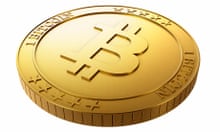About a year ago I bought 30 Bitcoins, the online peer-to-peer crypto-currency, for about £3 each using a European website called Bitstamp.net. Bitcoins appealed to my inner crypto-anarchist and I felt they had great potential. Unlike real money, they are decentralised and transactions are free; no bank in the middle taking their slice and nothing central to fail. Anyway, I forgot about them, and nine months on, in March this year, I saw some news about how their price was sky rocketing. I was amazed to find that my £100 investment was now worth over £2,000.
This got me interested. I dived back into the crypto-coin world and started to learn everything I could about them. I discovered that there were now many other crypto-coins too such as Litecoins, a sister crypto-currency to Bitcoins, and I began trading them on the exchange BTC-E.com. I also read up on things like the exponential market average crossover trading system, an age-old technique used by stock brokers. Over the next couple of months, to my astonishment, I managed to double my money. I decided to cash out at that point, by converting all my funds into Bitcoins on BTC-E and transferring them back to Bitstamp, partly because I didn't quite believe it all. But sure enough the money arrived in my bank account a few days later.
However, at heart I've always been a geek and what had really grabbed my interest by then was how new Bitcoins and Litecoins are created. To find new ones you have to "mine" them, which involves a computer doing huge numbers of difficult computations. The catch is that the more people are mining them, the harder it becomes to find new ones, so that the supply is limited. This means that they effectively have built-in deflation.
So, about four weeks ago I took my £4,000 profit, added another £11,000 from my savings and set about buying and building Bitcoin and Litecoin mining hardware in my spare time. For Bitcoins, I invested in pre-orders of new, specialised mining hardware called ASICs. For Litecoin mining rigs, I bought lots of Graphics cards and built computers out of them in plastic crates. I also regarded this as a home R&D project for my main business, Memset. We're a hosting/data centres company and I've been keen for us to experiment with GPU-based cloud computing so I was reassured that even if it came to nothing, I could likely find a use for what I learned.
Along my journey I had discovered that there were virtual securities exchanges games where one could float a virtual stock or bond quoted in crypto-currencies, and this too intrigued me. I decided I was going to need some help, so rounded up a few more techies, two of whom I'd met on the bitcoin forums and another two who are work colleagues. They all agreed to help me out in their spare time in exchange for shares in my planned virtual company. Next, while on a scuba holiday between dives, I made a business model and plan for our new company, "CipherMine". After crunching the numbers, my model was forecasting that with an extra £25,000 investment, we could be making £20,000-£30,000 per month profit from mining by the end of the year. It looked like we had a virtual business with potential.
By this point, I had also come to believe that Litecoins had greater potential for growth than Bitcoins, so I eschewed the Bitcoin exchanges and instead submitted CipherMine for flotation on Litecoin Global. We made our initial public offering on Monday last week. I think I probably got the IPO price a bit wrong since the 20,000 shares I listed sold out in a matter of hours. We raised a total of 15,667 Litecoins in exchange for 20% of CipherMine's shares; about £27,700 at current prices. We are in the process of investing that money into more mining hardware, but in the meantime, our share price has continued to rise. As I write this, under a week later, the shares are being actively traded at about 1.6 Litecoins each; double the IPO value.
CipherMine's market capitalisation currently stands at roughly 150,000 Litecoins, or about £250,000, of which 64% was mine at IPO. Again, partly to proverbially pinch myself and make sure it was real, I have sold a little over 2% of my holdings from which I've made about £3,000. CipherMine still owes me quite a bit, but if all goes to plan, my original costs should have been covered by the dividends on my shares come October.
I still don't quite believe it and there is a very real possibility that all the value could vanish in a puff of logic. However, I started this as a hobby and in many ways it still is. I've learned a lot and had fun along the way, so if that's all it comes to, I'll be content. I cannot help but be quietly optimistic though.
Kate Craig-Wood is the managing director and co-founder of Memset











Comments (…)
Sign in or create your Guardian account to join the discussion